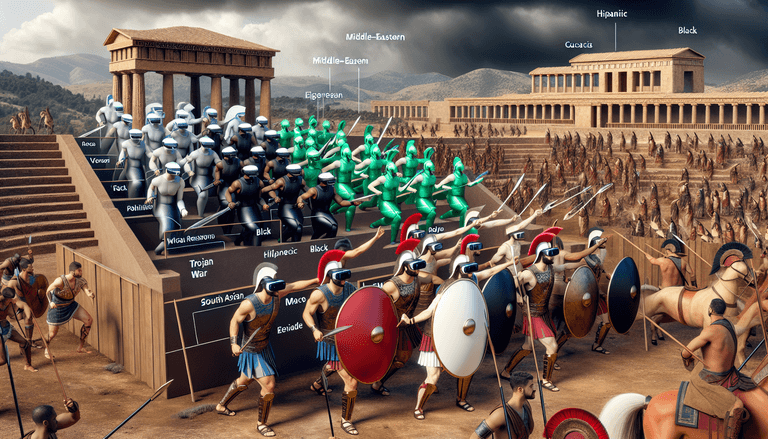A horse of a different reality
Long before the cunning Greeks crafted a wooden horse that would go down in history as a masterpiece of deception, what if they had a more virtual strategy up their sandals? Enter Virtual Reality, or as Homer might put it, "The Iliad in HeliAR." Imagine, dear reader, a Trojan War where pixels danced just as fiercely as soldiers, and headsets did most of the heavy lifting. Let’s embark on this whimsical journey of an ancient world meeting futuristic gizmos!
The VR curse breaker
Picture it: the besieged city of Troy, a decade-long deadlock with no end in sight, I can almost hear Helen complaining about the extreme length of waging war in sandals. The Greeks are at their wits’ end, Athene is on leave, and Achilles’ heel is giving him more grief than glory. Just when it seems like the Trojan War would require a sequel (perhaps an iWar), in comes Odysseus, with a brainstorm better than Zeus on brainstorming duty, Virtual Reality.
Imagine Odysseus pitching this novel idea to the Greek commanders as they stand beside a holographic rendering of the best angles to invade Troy. „Why toil with timber when cyberspace is at our feet?” he declares, winking as if channelling a 21st-century technology entrepreneur.
Virtually sneaky tactics
And so, the Greeks pivot from building colossal wooden sculptures to crafting bespoke VR experiences, a true Trojan force. On virtual battlefields, Greek armies could train without a single real-life injury. Hector could ambush Achilles in augmented arenas, with all the bravado but fewer bruises. Imagine the Trojans lifting their military VR headsets only to find their city had been virtual all along!
But could the famed Trojan Horse take a digital double role, you ask? Why, yes! The Greeks might have programmed the grand virtual equine to make the walls of Troy ‘see’ their very own army still stationed on the beach while the real soldiers crept into the city through a pre-rendered gateway, unseen yet cleverly captured by virtual trickery.
Mixed realities, mixed results
In a world where VR is the reality for both Greeks and Trojans, things could have turned quite Spartan, literally and metaphorically. The gods and goddesses might have looked at this merging of myth and tech, completely flummoxed. Meanwhile, the demigod Aeneas might have just spent his afternoons swooping through virtual skies, advertising the latest VR spear with a swish and a smirk.
Of course, one must ponder how Helen may have found the whole ordeal. Perhaps she would have used VR to pop into a virtual spa day or to check out recent chariot models without stepping foot outside her Trojan quarters. If anything, this could have been a real game-changer for product placements.
The delicate balance of AR morale
The mythological sands begin to shift when VR hits the battlefield, especially with morale. Imagine if, during a particularly tense siege, Paris announced “free to roam what was once Sparta,” using a magic motion controller in a virtual tour-like ceremony. Yet, just beyond the VR facade, tensions ran higher than poor Sisyphus on a good day.
More poignantly, perhaps, is the question of how the immortalities of the gods fared (Trending questions: "What is your user ID, Zeus?"). Did they support this alternative warfare, or were they left confused, trying to reinstall Asclepius's latest patch to revive fallen troops in uncanny ways?
Conclusion: Trojan tech triumph?
In this reality bent by VR, could Jake and Aaron’s Iliad instructional consultant, Homer, still capture the human element behind virtual interactions? Would our understanding of Troy's fall pivot on virtual strategy rather than wooden enterprise?
Ultimately, surrendering to the pixels, the Trojan War might have concluded in less time than it would take to unlock your phone. With virtual realities chasing virtual chimeras, the war might no longer have been about territory but about who could code the best Trojan programme.
Is VR the future of historical alternative endings? Only your future scrolls (or leaderboards) can tell!







